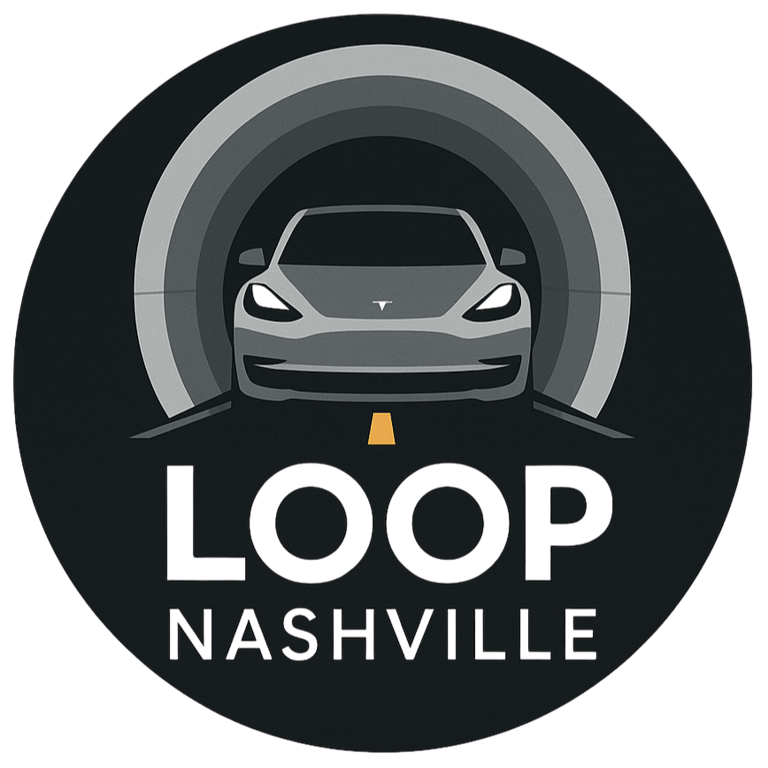Driverless Tesla Operations in Vegas Loop Signal What Could Be Next for the Music City Loop
The Boring Company will soon remove safety drivers from Tesla vehicles in the Las Vegas Loop, marking a major milestone in fully autonomous underground transit. The development offers a preview of what automated point-to-point travel could eventually look like in Nashville. [Read more ➝]
By the LOOP Nashville Editorial Staff
10/21/20252 min read
Source: Teslarati – “Tesla will launch driverless rides in Las Vegas, but not where you think”
The Boring Company’s flagship transit system in Las Vegas is preparing for a leap forward in automation. According to reporting by Teslarati, CEO Elon Musk announced that Tesla vehicles operating within the Vegas Loop will begin transitioning to fully driverless service, with safety drivers expected to be removed within the next one to two months. The announcement marks a significant step for the company’s vision of fast, point-to-point electric transit through compact underground tunnels.
Las Vegas Moves Toward Full Autonomy
The Vegas Loop currently uses Tesla Model 3 and Model Y vehicles to shuttle riders between major destinations, including the Westgate, Encore, and Resorts World. Although the system already uses Tesla’s Full Self-Driving software, each vehicle still includes a human safety driver. Musk now says those drivers will be phased out, making the Vegas Loop one of the first real-world environments where Tesla vehicles operate autonomously in regular passenger service.
The system is still expanding. The Vegas Loop’s long-term plan includes more than 100 stations and an estimated 68 miles of tunnel beneath the resort corridor. Removing safety drivers would allow vehicles to operate more efficiently, reduce labor costs, and scale more easily as new stations come online.
Tesla is pursuing a similar timeline for its “Robotaxi” program in Austin, where onboard safety monitors are still required today. Musk has stated these too could be removed by the end of the year.
Why Las Vegas Matters for Nashville
For cities considering loop-based tunnel systems, Las Vegas remains the primary test case. As the Music City Loop concept takes shape for Nashville, the Vegas milestone offers important takeaways:
1. Demonstrated regulatory pathway
The Vegas Loop is providing an early model for how local governments can permit, regulate, and oversee autonomous underground operations while maintaining safety standards.
2. Proof of operations without surface disruption
Driverless vehicles operating below traffic, on fixed routes, could reduce congestion and shorten travel times—both high-value goals for Nashville.
3. Scalable automation
As Las Vegas removes driver-related staffing needs, the economics of Loop systems shift. More stations and longer routes become more financially viable when each vehicle no longer requires a paid operator.
Potential Benefits for the Music City Loop
If Nashville advances its own Loop system in partnership with The Boring Company, driverless operations could:
Improve frequency and wait times for riders
Lower long-term operating costs
Enable 24/7 service with minimal staffing
Offer a predictable and congestion-free transit option for residents, workers, and visitors
Autonomous underground transit could also support growth around stations, particularly in areas targeted for redevelopment or entertainment-oriented tourism.
Challenges Still Ahead
Even as Las Vegas advances, several questions remain relevant for any future Nashville system:
State and local regulatory approval for autonomous passenger operations
Safety oversight and emergency response protocols in tunnels
Insurance and liability frameworks for autonomous vehicles
Public adoption and trust
Because Nashville has no legacy mass-transit tunnel network, the city can observe how Las Vegas resolves these questions before introducing Loop operations locally.
The Road Ahead
The Las Vegas announcement underscores how quickly autonomous tunnel systems are evolving. For Nashville’s Music City Loop concept—still in early stages—Vegas offers both a blueprint and a warning: the technology is moving fast, and cities that want to benefit from the next era of mobility will need to prepare their policy, regulatory, and infrastructure frameworks now.
The next 12–18 months in Las Vegas may reveal exactly what a fully automated Loop can deliver. Nashville decision-makers will be watching closely.
Disclaimer
LOOP Nashville aggregates publicly available news, commentary, and editorial content related to the Music City LOOP project. All source material is fully credited and attributed to its original publishers. All commentary and editorial opinions are solely those of the LOOP Nashville Editorial Staff. We are an independent site and are not affiliated with The Boring Company or the Music City LOOP project.
CONTACT
Follow
scoop@loopnashville.com
© 2025. All rights reserved.
